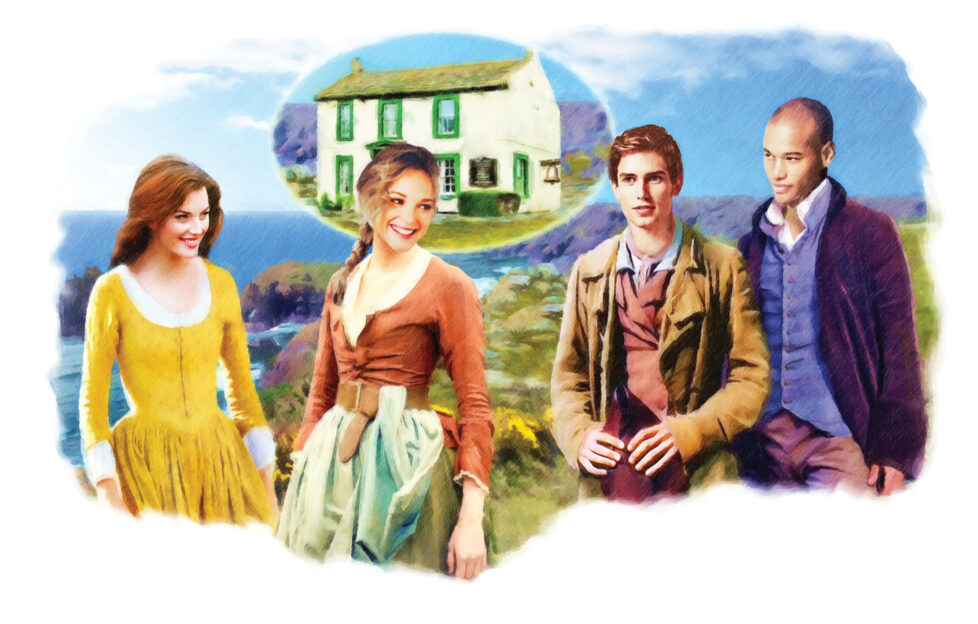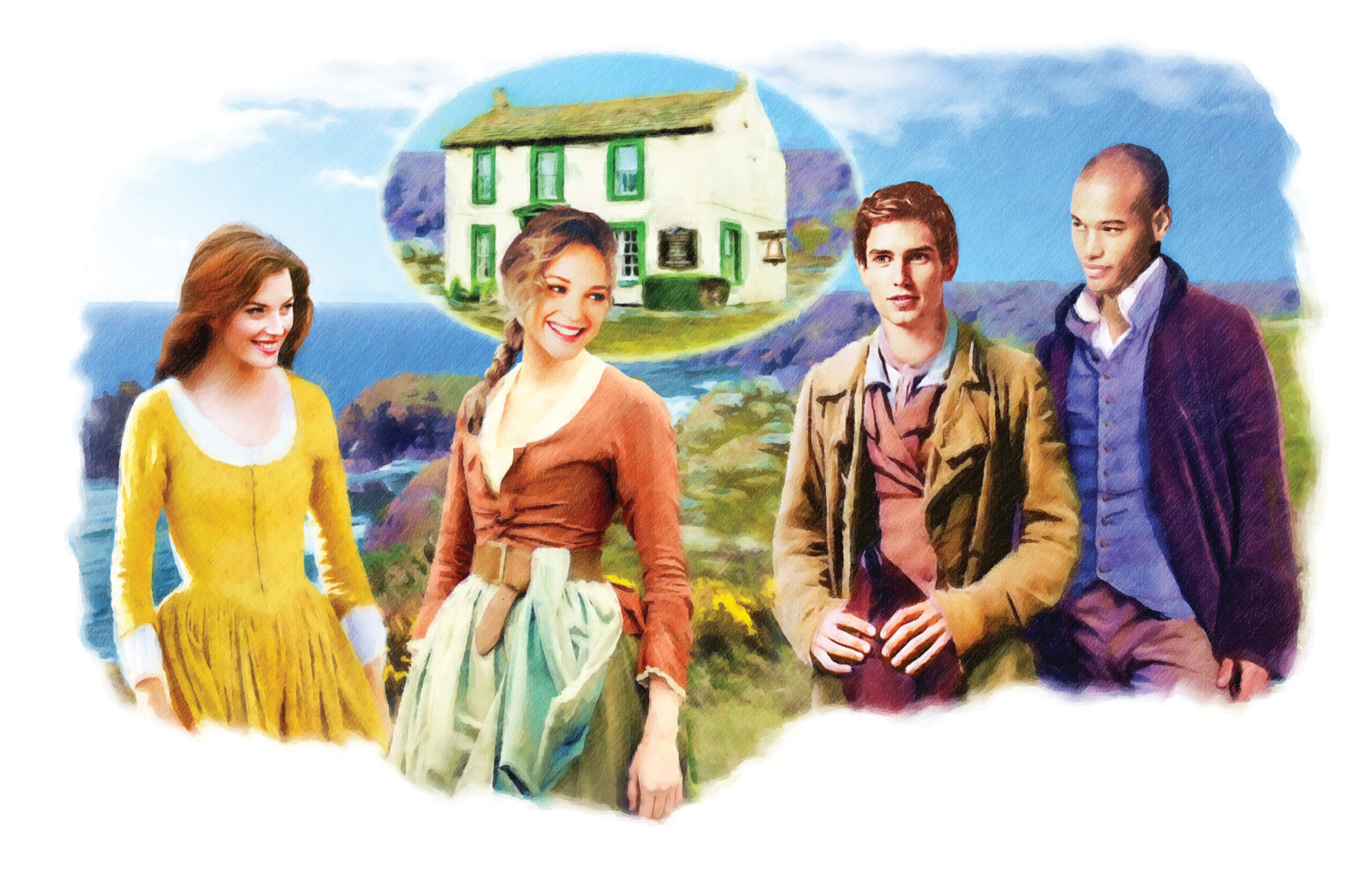The Mystery Of Macgregor’s Cove – Episode 01

The Mystery Of Macgregor's Cove by June Davies
- 1. The Mystery Of Macgregor’s Cove – Episode 01
- 2. The Mystery Of Macgregor’s Cove – Episode 02
- 3. The Mystery Of Macgregor’s Cove – Episode 03
- 4. The Mystery Of Macgregor’s Cove – Episode 04
As a girl, Amaryllis Macgregor’s daily chore was polishing the brass bell which gave the cliff-top inn overlooking Macgregor’s Cove its name.
This task at the Bell Inn was now done by her younger sister, Betsy, and Amaryllis’s first job this summer morning was to gather fruit from the St Agnes ruins.
The mediaeval priory’s orchards had grown wild and, like much of the land along the Lancashire coastline, were the property of Elias Whitlock from Haddonsell Grange.
Mr Whitlock didn’t mind the Macgregors gathering fruit, but Amaryllis wondered if this would change now young Mr Adam was returning from India to manage the estate.
Her trugs brimming with berries, she set off home.
The dunes gave way to cliffs. Her uncle Iain’s boatyard came into view, and beyond, perched on the cliff-top, was home, the Bell Inn.
She could see Betsy, on tiptoe upon a stool, rubbing the bell vigorously.
As she drew closer she saw Betsy close her eyes and murmur the prayer that the bell might not ring out this day. It was a tolling bell, rung only upon sight of a vessel in distress.
Beside Betsy, Flossie lay, her head on her paws. Child and dog were seldom parted, and since Betsy lost her hearing through illness several years ago, Amaryllis believed Flossie had become the little girl’s ears.
The white dog stirred at Amaryllis’s approach. Wagging her tail, she went to Betsy’s side. Betsy looked around, saw Amaryllis and waved.
“Did you get everything on Ma’s list?” she called.
“I did.” Amaryllis lowered the trugs. “And more.”
“Cherries!”
Betsy’s lip-reading of those she knew well was almost word-perfect, and accurate enough with others so she could follow a question or conversation.
“I shinned up trees to gather enough. I grazed my knee,” she went on, aware her hair had escaped its braid. “I’d best get tidied up before Ma sees me.”
She ran across to the house, which adjoined the inn at a curious angle, and was at the kitchen door when her elder sister, Dorcas, swept out through the front porch, a shawl about her shoulders and a becoming bonnet shading her fair complexion.
“Why have you been so long? Ma needs you to peel potatoes. You know how many folk are arriving at the inn today!”
“I thought you were helping Ma in the kitchen while I went to the ruins!” Amaryllis exclaimed. “Where are you going?”
“Into town for ribbons for my dress.” Dorcas shook her curls. “I’m singing tomorrow evening and can’t wear my lilac without something to adorn it.”
“You’re going into St Agnes to buy ribbons when we’ve chores?” Amaryllis challenged her. “Tomorrow is a singsong with Uncle Iain and Great-aunt Macgregor; not one of the Whitlocks’ fancy balls at Haddonsell Grange!”
Dorcas sniffed.
“A young lady must always be mindful of her appearance.”
She cast a disparaging glance at her sister’s dishevelled hair and damp, sand-spattered skirts.
“You’ll never catch a wealthy husband and make a good marriage, Am.”
“I’m not sure I want to catch a husband – wealthy or otherwise.”
“You’re a fool, Amaryllis Macgregor!” Dorcas returned airily. “A woman without a husband has no status. You’ll end up a miserable old maid like Penelope Whitlock.”
“That’s a mean thing to say, Dorcas. Miss Whitlock is such a kindly person.”
“She is past thirty with all hope of marriage gone.” Dorcas took a final, scathing appraisal of her. “If Ma sees you looking like that, she won’t be pleased.”
Dorcas flounced off along the lane towards the market town of St Agnes.
* * * *
Setting the day’s batch of loaves to cool, Ethel Macgregor watched Dorcas setting off from the window of the Bell Inn’s big kitchen, and felt a surge of love and pride swelling her heart.
Dorcas was a beauty, with poise and grace to everything she did.
Goodness knew where she got her looks and dainty ways. Even on her best day Ethel had been plain, and from what she’d seen of the Macgregors, Sandy’s kin were no oil paintings, either.
She and Sandy hadn’t been young when they’d wed. Ethel had feared it might be too late for babies, but although the first two came along quick enough, both were girls.
Ethel hadn’t borne the son she’d been praying for, and was forty-four when she delivered her final child – another girl.
Sandy loved his three daughters dearly and there was no better father, but Ethel felt it must grieve him sorely. Wasn’t it natural for a man to want a son to carry on the family name?





